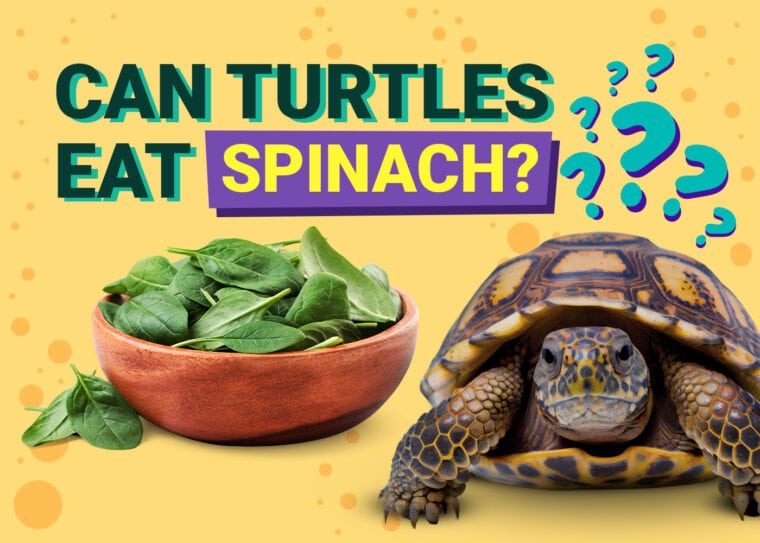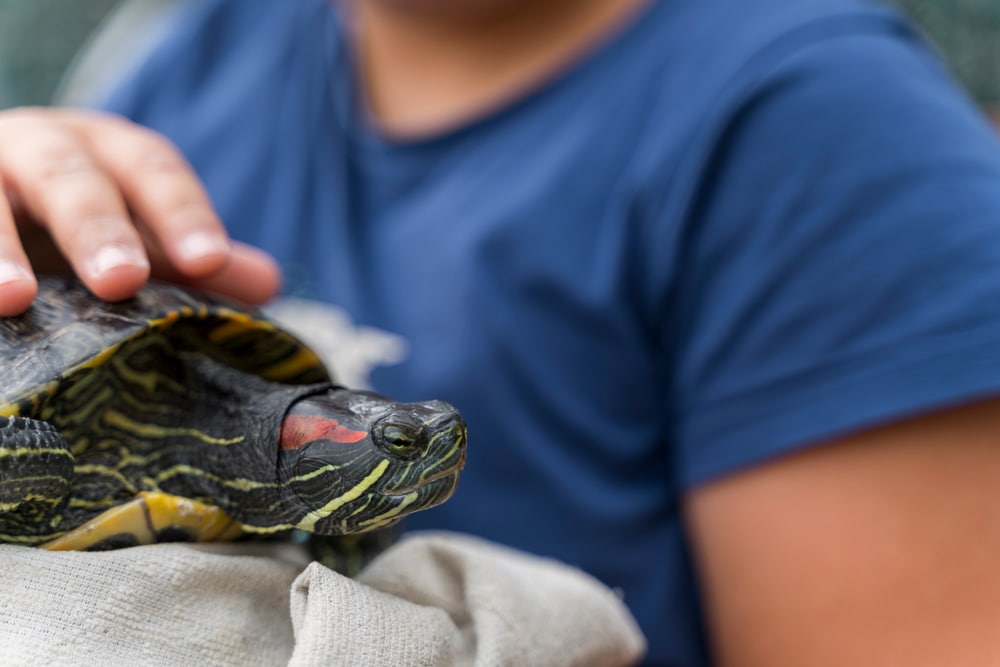
Before feeding our pets fresh foods in their diet, we need to ensure they are non-toxic and healthy to consume. Turtles are known for consuming a variety of leafy greens and vegetables, but can they eat spinach?
The short answer is yes. Most healthy omnivorous pet turtles can safely consume spinach in moderation as part of their daily vegetable mix. Spinach has some nutritional upsides and downsides to consider though.
Let’s explore this vegetable in greater detail.
Turtle and Spinach
As there are many species of turtles kept as pets, the focus of this article will be primarily on aquatic freshwater turtles, and the North American box turtles (of the genus Terrapene).
For most healthy adult omnivorous pet turtles, spinach is considered a safe addition to their diet. It does have a somewhat interesting nutritional profile.1
The nutritional analysis of spinach shows that they do contain useful nutrients for turtles. The calcium to phosphorus ratio seems favorable, and additional vitamin A is a welcome addition. To top it off, spinach is exceptionally low in sugar and contains very low goitrogens (compounds which may lead to thyroid issues).
Why Should Spinach Be Fed Sparingly to Turtles?
Spinach is not without its downsides and should be offered in relative moderation to your pet. Spinach contains very high amounts of oxalic acid, a compound which may limit calcium absorption. As a turtle owner, you may already be aware that adding calcium supplementation to your turtle’s diet is usually recommended. Eating spinach in high amounts would therefore be a potential health concern for your turtle.
Spinach is a little tricky because while it’s full of calcium, research indicates that the oxalate in large amounts will limit the amount of calcium your pet receives from the vegetable 2. Though the extent of the loss is difficult to determine, an experiment in rodents yielded a bioavailability of around 35% calcium from spinach (in other words, approximately ⅔ of the calcium wasn’t bioavailable for the animals) 3.
Spinach isn’t the only vegetable that contains high amounts of oxalic acid. Beets, turnips, rhubarb, yams, and collards are a few others that are best avoided.

Importance of Calcium
Calcium is a mineral that is essential for building and maintaining bone strength. All animals that are kept as pets require calcium in their diet, with recommended amounts varying by species. It is very important to note that the calcium content of any food cannot be assessed on its own, as calcium interacts with other minerals (particularly phosphorus). Therefore, ratios and proportions of various minerals are required prior to determining if any food source is a good source of calcium for your pet.
A turtle’s shell is composed of bone, making calcium an especially important component for your turtle’s health and well-being. Vegetables and leafy greens are the prime sources of calcium in a turtle’s diet, so you need to ensure they are getting enough.
Long-term calcium deficiency can result in a soft shell, also known as metabolic bone disease (MBD). This condition can be fatal to your turtle.
Proper Diet for a Turtle
The proper diet for your turtle depends greatly on their species, size, age, and habitat, and other intrinsic factors. Most aquatic turtles are omnivores and will eat both meat and plant life. Omnivorous turtles are usually fed commercial turtle food pellets, feeder fish, insects, fruits, and vegetables. If your turtle is herbivorous, they will eat only fruits and vegetables.
Let’s look at some common animal protein sources, vegetables, and fruits fed to turtles. Remember, though, this greatly depends on the species of your turtle. Also keep in mind that their nutritional needs will constantly change throughout their life.
Animal Protein Sources

Vegetables and Leafy Greens
Fruits
Concerns for Feeding Pet Turtles

In addition to the possible health issues that can be caused by consuming too much spinach, there are other concerns you should consider when feeding your turtle.
Conclusion
Spinach can be fed to most adult omnivorous pet turtles in moderation; caution is advised due to the high amounts of oxalic acid that can limit the absorption of a staple mineral in a turtle’s diet, calcium. The good news is that plenty of other vegetable and leafy green sources exist which means that your turtle always has more options for their meals.
Different species of turtles are going to have varying dietary requirements. It’s best to contact your veterinarian with any questions or concerns regarding your turtle’s diet. They can help you develop a well-balanced diet plan to ensure your turtle is as healthy as possible.
Related Reads:









